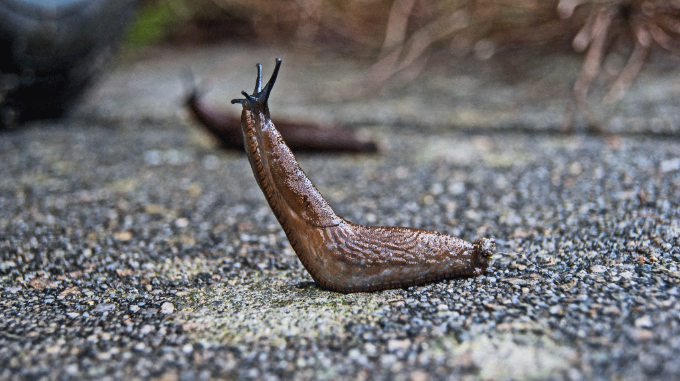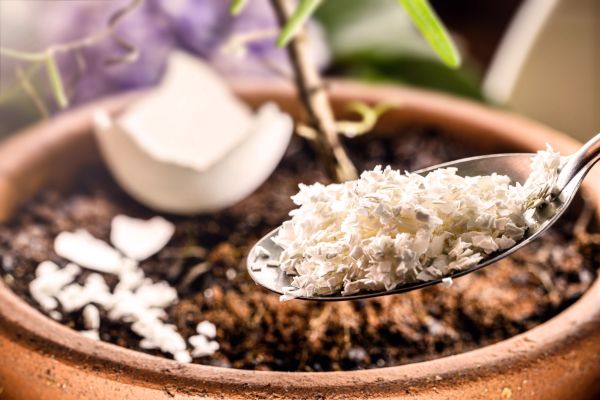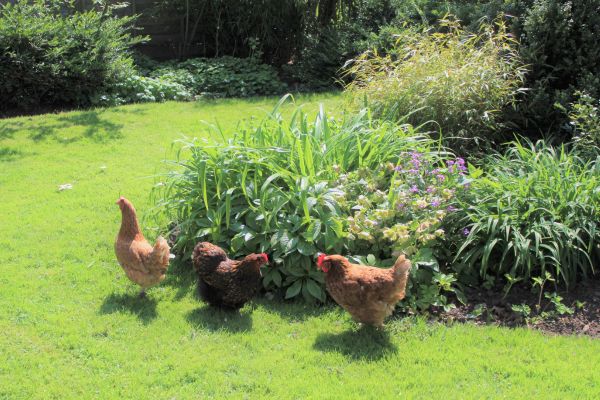Slow-moving, slimy slugs are everywhere this time of year. These shell-less gastropod mollusks munch on leaves, flowers, and plants, leaving behind a trail of destruction. They can also infect pets that eat them with lung worms.

Danger!
While slug bait seems like a quick fix, it can be extremely dangerous to dogs and cats. That’s because the bait includes brown sugar or molasses to attract slugs. The sweet smell and colorful pellets entice curious pets, leading to accidental ingestion.
Even a small amount of slug bait – less than a teaspoon – can be fatal.
In addition to brown sugar or molasses, slug bait (which comes in pellet, liquid, or powder form) typically contains a chemical called metaldehyde, a highly toxic compound for dogs and cats. Metaldehyde acts as a neurotoxin, disrupting a pet’s nervous system functions.
Symptoms of Metaldehyde Poisoning
Be aware of the following signs of metaldehyde poisoning, which can occur within 30 minutes to 3 hours after ingestion:
- Anxiety
- Panting
- Twitching
- Muscle tremors
- High fever
- Hypersalivation (drooling)
- Ataxia (lack of coordination)
- Difficulty breathing
- Vomiting
- Diarrhea
- Convulsions / Seizures
Immediate Action is Crucial!
If you notice any of these symptoms, contact your veterinarian or animal poison control center right away. The earlier treatment begins, the better your pet’s chances of a full recovery.
9 Safer Alternatives for Slug Control
Luckily, there are several pet-safe alternatives to slug bait that can keep your garden healthy and your furry companions safe.
Here are 9 effective methods:
1. Natural barriers
Create a physical barrier around your plants using crushed eggshells or coffee grounds. These materials irritate the slugs’ soft bodies, deterring them from your greenery.

2. Diatomaceous earth
This natural powder is made from fossilized algae and it dehydrates slugs and snails on contact. Apply a thin layer around plants, but be sure to reapply after rain.
3. Copper barriers
Slugs dislike the sensation of moving across copper. Placing copper tape around raised beds or containers can deter them from climbing up.
4. Beer or milk traps
Dig a shallow container level with the soil and fill it with beer or milk. Slugs are drawn to the scent and drown in the liquid. Empty and reset the trap every few days. This method can also be attractive to other animals, so use caution.

5. Cornmeal traps
Cornmeal is cheaper than beer or milk, but may not attract as many slugs. Put 1-2 Tablespoons of cornmeal in a jar and lay it on its side. Keep the cornmeal dry, and it will kill slugs by expanding inside them.
Note: Rain will ruin liquid and cornmeal traps, so cover the traps to keep water out. If your pets will drink or eat the bait, cover the traps with something sturdy, such as an upside-down flowerpot with a small entrance.
6. Nematodes
These microscopic parasitic worms are natural predators of slugs. When applied to the soil nematodes hunt down the slugs, effectively controlling the population.
7. Natural predators
Birds (chickens, ducks robins, jays), hedgehogs, toads, and ground beetles love to feast on slugs. Create a wildlife-friendly garden to attract these helpful creatures.

8. Humane traps
Slugs gather in moist, shady environments. They like to hide beneath flower pots, wooden planks, or cardboard boxes. Set these up and attract slugs with dry pet food, cabbage leaves, or citrus fruit rinds, moistened with water. Check traps daily and discard the living slugs a long way from your house and garden.
9. Handpicking
Handpicking slugs at night and relocating them elsewhere (far from your garden) can be effective for small infestations. A less humane option is to skewer slugs with a stick and drop them into a bucket of soapy water. Be sure to wear disposable gloves when hunting slugs.
You’ll find additional ideas for getting rid of slugs in this article at wikiHow.
By opting for these safer alternatives, you can protect your plants and furry friends from the dangers of slug bait. A healthy garden doesn’t have to come at the cost of your pet’s well-being.


